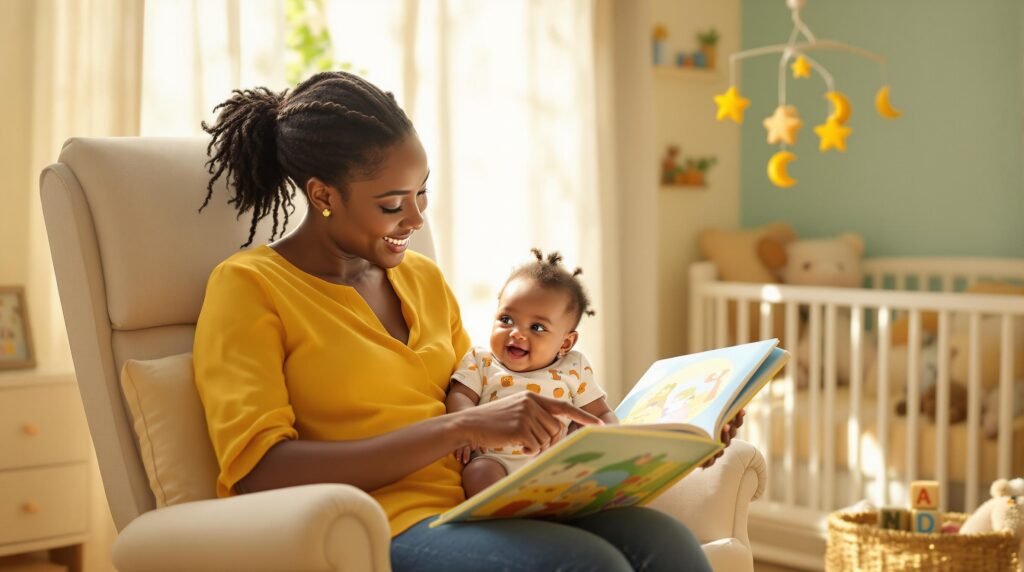Table of Contents
ToggleLanguage development is a crucial aspect of a baby’s growth, marking significant milestones in their cognitive and social development. As a parent, you play a pivotal role in nurturing your child’s language skills from the earliest stages. This article will guide you through the process of encouraging your baby’s language development, providing practical tips and insights to help your little one flourish.
Understanding Language Development Milestones
Language development occurs in stages, with each milestone building upon the previous one. It’s important to remember that every child develops at their own pace, but certain milestones serve as general guidelines:
6 Months
At this stage, your baby will likely start babbling, making consonant sounds like “b” or “m”. They may begin to understand the word “no” and might even say simple sounds like “mama” or “baba”. These early vocalizations are the foundation for future language skills.
9 Months
Your baby may start pointing at objects, demonstrating their desire to communicate. They’ll likely understand basic commands and engage in interactive games like peek-a-boo. This is a crucial period for play-based learning and development.
12 Months
By their first birthday, many babies can respond to simple commands, make meaningful gestures, and combine sounds to form simple words. They might say “mama” or “dada” with intent, marking an exciting milestone in their language journey.
Understanding these milestones can help you track your baby’s progress and provide appropriate support at each stage.

The Power of Parental Interaction
Your interactions with your baby are the bedrock of their language development. Here’s how you can make the most of these precious moments:
Engage in Conversations
Talk to your baby frequently, even before they can respond. Describe what you’re doing, narrate your day, or simply chat about what you see around you. This constant exposure to language helps your baby absorb vocabulary and sentence structures.
Respond to Their Coos and Babbles
When your baby makes sounds, respond as if you’re having a conversation. This back-and-forth interaction teaches them the rhythm of communication and encourages them to vocalize more.
Read Books Together
Reading to your baby is a powerful tool for language development. It exposes them to new words, sentence structures, and concepts. Choose books with colorful pictures and simple text, and make reading a daily ritual.
Cognitive Development and Language Skills
Language development is closely tied to cognitive development. The preoperational stage, which occurs between ages 2 and 7, is particularly relevant for language acquisition. During this stage, children develop symbolic thought, allowing them to use words to represent objects and ideas.
To support this cognitive leap:
- Play naming games to help your child associate words with objects
- Encourage pretend play, which fosters symbolic thinking
- Use language to describe abstract concepts like emotions
Creating a Supportive Environment for Language Growth
Your home environment can significantly impact your baby’s language development. Here’s how to create a language-rich space:
Use Simple Language
When talking to your baby, use clear, simple language. Short sentences and familiar words help your baby process and understand what you’re saying.
Provide Interactive Opportunities
Create opportunities for language interaction through reading, singing, and playing. These activities not only expose your baby to language but also make learning fun and engaging.
Limit Screen Time
While educational programs can have their place, nothing beats real-world interaction for language development. Prioritize face-to-face communication over screen time.
The Role of Quality Child Care in Language Development
If your baby spends time in child care, the quality of that care can impact their language development. The NICHD Study of Early Child Care and Youth Development found that high-quality care is associated with better cognitive and language outcomes.
Quality child care should include:
- Interactive teacher-child communication
- Language-rich activities like storytelling and singing
- A nurturing environment that encourages exploration and communication
Cultural Influences and Individual Differences
It’s important to recognize that cultural practices and individual differences can influence language development. Some cultures emphasize verbal communication more than others, while some focus more on non-verbal cues.
Remember that individual differences in language development are normal. Some babies may start talking earlier, while others might take a bit longer. What’s most important is consistent progress over time.
Early Intervention for Language Delays
While individual differences are normal, it’s crucial to be aware of potential language delays. Early intervention can make a significant difference in addressing specific language needs.
Keep an eye out for these potential red flags:
- Not babbling by 9 months
- Not using gestures like waving or pointing by 12 months
- Not saying single words by 16 months
- Not using two-word phrases by 24 months
If you’re concerned about your baby’s language development, don’t hesitate to consult with your pediatrician. They can assess your child’s progress and recommend appropriate interventions if needed.
Practical Tips for Parents
Here are some easy-to-implement strategies to boost your baby’s language skills:
Narrate Your Day
As you go about your daily activities, describe what you’re doing. This constant exposure to language helps your baby connect words with actions and objects.
Use Gestures
Accompany your words with gestures. This visual reinforcement can help your baby understand and remember new words.
Sing Songs and Nursery Rhymes
The rhythm and repetition in songs and rhymes make them excellent tools for language learning. Plus, they’re fun for both you and your baby!
Encourage Imitation
When your baby makes a sound, repeat it back to them. This encourages them to keep vocalizing and helps them learn the back-and-forth nature of conversation.
Be Patient
Language development takes time. Be patient with your baby and celebrate each small step in their language journey.
Remember, every interaction is an opportunity for language learning. By understanding your baby’s developmental milestones and providing a language-rich environment, you’re setting the stage for your child’s lifelong journey of communication and learning.
Encouraging your baby’s language skills is a rewarding process that strengthens your bond while supporting their cognitive development. By implementing these strategies and remaining attentive to your baby’s progress, you’re providing them with the best possible start in their language journey. Remember, every coo, babble, and eventually, word, is a step towards your baby’s mastery of language. Enjoy this exciting phase of your child’s development!
Sources:
Developmental Milestones
The NICHD Study of Early Child Care and Youth Development
National Institute of Child Health and Human Development (NICHD)
Centers for Disease Control and Prevention (CDC) – Child Development












This Post Has One Comment
Pingback: How to Encourage Early Communication in Babies – GuideForKids
Comments are closed.